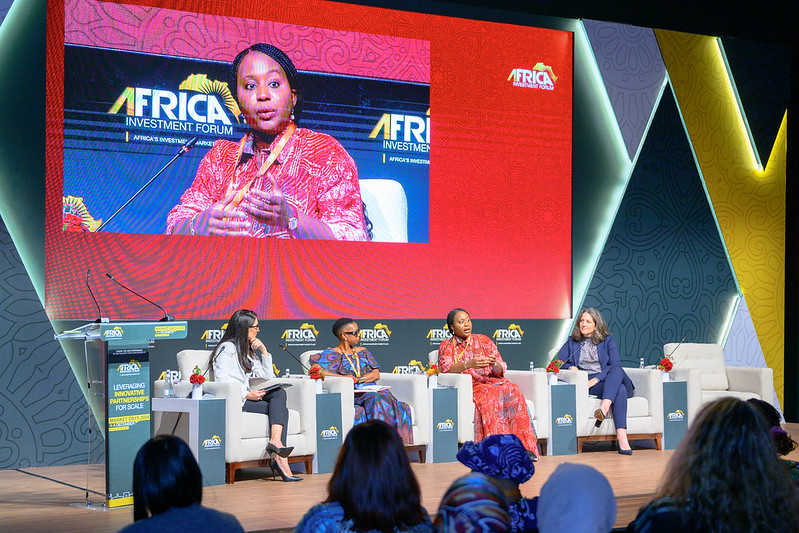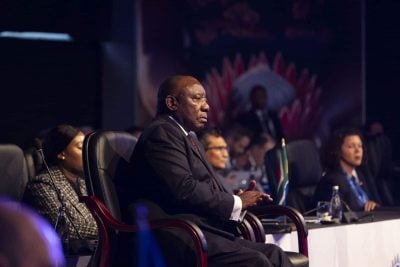This article is part of a series produced in collaboration with the African Development Bank in light of its sixtieth anniversary. Please visit our dedicated portal to read about the Bank's history and its activities on the continent.
Gender lens investing has been mainstreamed into the operations of the African Development Bank, the continent’s biggest development finance institution. This was revealed by Dr. Akinwumi Adesina, president and chairman of the Bank at an Affirmative Finance Action for Women in Africa (AFAWA) Day event during the Africa Investment Forum in Rabat, Morocco.
“You can’t get anything done at the Bank if you are not paying attention to how those projects will impact women, directly or indirectly,” he told the gathering.
The Affirmative Finance Action for Women in Africa is an initiative designed by the Bank and supported by the Women’s Entrepreneurs Finance Initiative (We Fi), G7 participating countries Canada, France, Germany and Italy as well as Netherlands and Sweden, to make $5bn in financing available for women-led and owned businesses to help bridge the $49bn gap that women in Africa face. Adesina said he was motivated to devise a solution when as a young executive, he frequently met women traders on the plane between Lagos and Abidjan.
“When I became president of the bank, I said we have to make sure that these women get the financing they need to be able to thrive in their businesses,” he recalled.
AFAWA on Mission to Mobilise the $5 Billion for Women Entrepreneurs
Adesina reported that as of the end of November, “AFAWA has approved $2.42bn for women entrepreneurs in Africa”. Of this, $1.14 bn has been disbursed to 18,607 women businesses in Africa. This has been achieved by working with the African Guarantee Fund, the implementer of the Guarantee for Growth program, and 185 financial institutions across 44 African countries. At this rate, I am fully confident that AFAWA is well on course to meet its set target to mobilise the $5 billion for women-led and women-owned enterprises in Africa by 2026,” Adesina predicted, adding that “I can tell you there’s never been anything like AFAWA on our continent.”
While women make up about 40% of all micro, small, and medium-sized enterprises on the continent, they face considerable, structural challenges in accessing finance. At the higher end, research by the International Finance Corporations shows that women account for less than 10% of venture capital funding and just 5% of private equity investments. Adesina argued that in spite of the disadvantages they face, women are in fact bankable and the success of AFAWA is proof.
Growth and Expansion Shows AFAWA Transformative Impact
Pauline Otila, founder of Apiculture Ventures in Kenya, exemplifies the transformative impact of AFAWA. Starting with $20,000 in financing from an AFAWA-affiliated bank, she has expanded her beekeeping network from 1,200 to 10,000 farmers. Her company now supports 25,000 beekeepers across 20 counties in Kenya, selling over 20,000 hives. This growth has led to average annual earnings increasing more than sevenfold. Another example is Ebun Feludu, the founder of Kokari Coconuts and Company in Nigeria. Established in 2016, her enterprise processes coconuts into premium lifestyle, food, and personal care products. With the support of a $40,000 AFAWA backed-loan, she successfully expanded her export operations to the United States.
Adesuwa Okunbo Rhodes, founder and managing partner of Aruwa Capital Management, also shared her experience running a private equity firm since 2019. She said she was driven by the fact that only 2% of venture capital funds go to female entrepreneurs, while research shows that female capital allocators are twice as likely to invest in female entrepreneurs and three times more likely to back female CEOs.
“So I set out on this very bold journey to set up my own fund as a solo female general partner. I was 29 years old at the time and five months pregnant,” she recalled.
AfDB President Urging Investors to Support Women-Led Businesses
With initial backing from high-net-worth individuals, predominantly women, across Nigeria, the United States and Europe, Aruwa has managed to attract funding from the MasterCard Foundation and FSD Africa. By the end of 2022, the fund had closed its first oversubscribed round, raising over $20m. We’ve deployed capital into 10 companies in Nigeria and Ghana. About 70% of our portfolio is female founded and female led. We’re supporting over 175,000 direct and indirect jobs through the SMEs that we support. And now we’re raising our $50m fund too,” she said.
The success of AFAWA and firms like Aruwa show that more support for women-led business would yield great results and Adesina urged more investors to back women-led businesses. “I ask all the investors to join us on this great effort to elevate women businesses. When women businesses win, African economies win. Let’s elevate women businesses and ensure that they are never hidden again,” he charged.

 Sign in with Google
Sign in with Google 



